I want to talk a little about writing as separation and writing as integration. When my kids were very young, I needed space. Physical space, psychic space, intellectual space. When I was working on my novel Motherest at various stages, I’d occasionally take a long weekend in an economy hotel an easy drive from home. (PS: if you like hotel literature, you’ll love Melissa Broder’s forthcoming Death Valley.) I’d get there, pull off the bedcover, lay across the bed, and for about ten minutes simply bask—in my solitude, in what felt like a successful escape. I didn’t question it or feel guilty. I considered it “traveling for work,” and I believed in the work that I had to do. Those hotel interludes were hysterically productive: I’d wake early, make my bad room coffee, and sit at the particle-board desk, getting up every forty minutes or so to stretch and do pushups. At some point, I’d probably use the hotel treadmill, shower, and then sit back at the desk. Meals were Spartan, what the internet would now call girl dinners. To waste a single moment, I thought, would be to insult my time; the support given to me by my husband, who’d be full-contact parenting in my absence, and the work itself. If I wanted to be taken seriously, I had to take my work seriously. The TV never went on and I didn’t futz around on the internet. SERIOUS!
I’m writing this from Mentone, AL, 2.5 hours from home, where I’ve been for a few days, a DIY residency that I’m paying for with grant money. On my grant applications I’ve said the same thing over and over: I have a full-time job, and I have children. A “proper” residency (Yaddo, MacDowell) would not work for me at this stage of life. But time is money and money is time and having a little purse from which to withdraw funds used in service to my writing feels like a good way to “stay serious.” I think I said in my last post, back in the spring when I took a few days to write in Oxford, MS, that money doesn’t solve the time problem. I can’t close the bookstore or hire a replacement for a few days. So I know that my absence could, ostensibly, create more work for other people, and that factors in to these decisions, too. Reviewing schedules with my husband prior to leaving, the insane Tetris of our girls’ busy lives and activities combined with his demanding job, I really had the thought: is this worth it? All of these acrobatics, and for what? So that I can chip away at something that may one day be Something Real, but also, may not? This isn’t about “staying positive” or having a good attitude. I secretly can’t stand it, when I’ve talked about the true cost of writing, when well-meaning folks say “aw, keep at it!” I mean, yeah. Of course I will. If I could stop this nonsense, I absolutely would, but I’ve been doing this work—writing and publishing—for over twenty years, so clearly I don’t have an issue with commitment. I don’t quit when it’s hard. It’s always hard. It has literally never not been hard. I am, to my bones, a loyal person. If I had to choose an epitaph for myself, my gravestone, it would probably be: She stayed. It’s nothing to take credit for and in fact it has sometimes proven harmful, but it’s a core fixture of my identity.

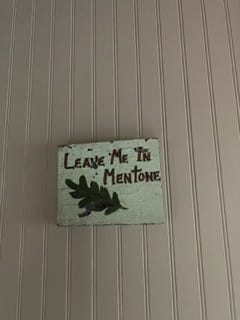
Here in Mentone, weird things have been happening, both in the physical world and in my brain. I got to the cottage I’d rented on VRBO and it was so charming, but reeked of cigarette smoke. I turned on fans and opened windows but it didn’t help, and I knew I wouldn’t be able to sleep or concentrate. I texted the contact person and she immediately offered another property, another cottage just behind the one I was in. It’s perfect, except for a few ants in the kitchen area, who aren’t really bothering me. There’s a pond out back with some fake wildlife in it that I thought was real for the first twenty-four hours: ducks and turtles. My phone signal has said SOS the entire time I’ve been here, despite the wifi.
On my first evening, I realized I’d forgotten the power cord for my laptop. My heartrate still wasn’t totally normal post-cigarette-smoke panic, and it stayed elevated as I frantically Googled office supply stores. I was able to purchase a universal cord from a Walmart 22 miles away, to be picked up the next morning. Fine, I said. No big deal. I worked until my battery died, ate a potato, and then read for a while. I tried not to be on my phone but I felt restless, lonely, strange—new feelings for me in this context, where these getaways have so often felt like a balm, where my focus has been razor-sharp and my gratitude has been good company. My version of a spa weekend, I’ve joked—me and my laptop. I chalked it up to first day jitters, the stress of the smoke and the power cord. My phone, a reliable tranquilizer.
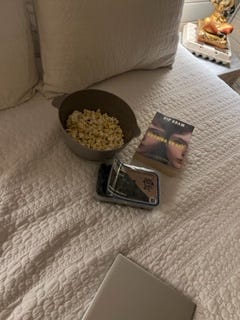

Next morning, I said hi to what I thought were real ducks, drank coffee, self-consciously wrote in my journal, read the incredible title story of Yiyun Li’s new collection, Wednesday’s Child, and cried a little (thanks, Yiyun). Then I got myself back in the car to drive to the Walmart in Fort Payne, a beautiful drive. The beauty of this area is stunning—people don’t even know about Alabama. Idly I thought, I should hike, but then quickly thought, no, and then did battle with some hike-guilt, and then laid the matter to rest. I have a book to write!
The Walmart was nice and clean and friendly and I had the weird urge to stay there for a while, touching things. But I got my cord and drove the 30-ish minutes back to the cottage and plugged in my inert laptop and after a moment the screen lit up. Success, I thought, we’re back in business. But the battery got to 8% and wouldn’t budge. I found myself deep in the universal cable/Dell laptop Reddits and learned that many laptops respond initially to universal power cords but then don’t actually charge the battery, that some “proprietary chip” is missing, and that damage can actually be done to the “motherboard” (still not convinced that’s a thing/insert Carrie Bradshaw meme here). BPM once again rowdy. I tried calling “DeKalb Computers,” 25 minutes away, but my call kept dropping (SOS). I noted their hours and got back in the car, laptop in tow, praying fervently that someone over there had a correct cord.
DeKalb Computers was amazing and I want to save it for my fiction. The woman there yanked a cord out of a laptop on a shelf, handed it to me, and made up a price. (We first plugged it in to make sure it worked properly.) There were two (!) tip jars (!) and I would have tipped if I’d had cash on me. I felt ebullient on my drive back. Problems are so great when you can solve them.
So, no more excuses, right? It was even starting to rain a little! I made more coffee and a soft nest on the couch and felt a surge of bliss. And the thing is guys—I did write! I wrote a lot more than I would have at home. But I couldn’t shake this hollow feeling I had, that made me keep reaching for my phone, texting my family and friends, looking at cute things on the internet. I had space, I had time, but there was something gumming up the works.
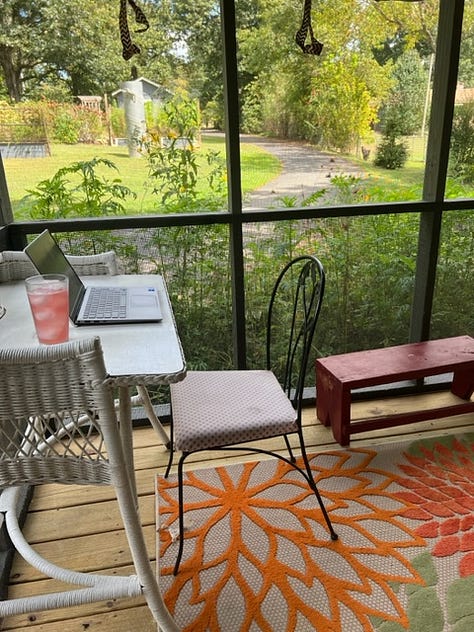
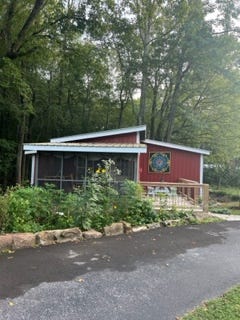

And I guess what has slowly dawned on me is that I no longer want a separate life for art-making. I don’t want to leave my life in order to do it. Leaving used to feel like a gift, and a necessary praxis. And now the gift is the realization that I have a life that I don’t want to abscond from. The work no longer demands it. The work is coming, as it were, from inside the house. I need to be there to meet it.
Most of the books that I’ve read about artmaking and motherhood focus on infants and young children**. I don’t have any sort of urge to write “formally” in this vein but I do think that having a tween and a teen creates a very different parenting landscape, with very different implications for artmaking. And that landscape is going to keep shifting—as I am raising them, they are raising me. Why would I expect that the tools that worked five and ten years ago, when I was a different mother and a different writer, to continue to be effective in the same way? That has been one of the big epiphanies of the last few days: I’m not the same writer because I’m not the same person because I have been changed by motherhood, a change I feel more acutely now than I ever have. I don’t have the same goals. To parent a teen in many ways means to go back to the drawing board, to risk being a beginner, to microdose failure. And I think I’m experiencing a parallel novicehood with my writing, which, far from discouraging me, fills me with joy. It all feels new again.
**One recent exception to this is Samantha Hunt’s The Unwritten Book, which isn’t a motherhood book, at least not according to its BISAC category, but is very much an artmaking memoir, whose section on the One Direction fandom the author shared with her daughters I think about at least once a week.
I don’t think I’ve ever doubted or denied that motherhood has changed me. But I do think, in the erstwhile years of writing while mothering, I compartmentalized my writing life quite successfully. There were pieces that equated to a whole. Now, those pieces have grown, fused together. To want to keep them distinct feels regressive. It’s not, how do I tweak my life to accommodate my writing, but how do I tweak my writing to accommodate my life? And it’s not simply FOMO as in, “every moment is precious,” because, let’s face it, some moments are terrible and absolutely worth missing. It’s more a fear of missing the point. The point is life! Creating one that can contain it all, flexibly, forgivingly, and with a sense of fun.
I posted this text exchange to my Instagram stories last night and got so many responses, ranging from tap-hearts to DMs of solidarity to others along the lines of “aw, I’m so sorry!” It gave me the sense that other people are also recalibrating their relationships to their work and routines, and while I weary of these discussions—I almost didn’t write this overlong thing, as I almost don’t write most of what I post here—I guess they’re also maybe important in their way. Self-knowledge isn’t in and of itself the goal—it’s what we do with it. Maybe this will help someone? And I hope it will help me to make better, more challenging, more invigorating art, with more pleasure. What did Lucia Berlin say? “I just wrote to—to go home.”





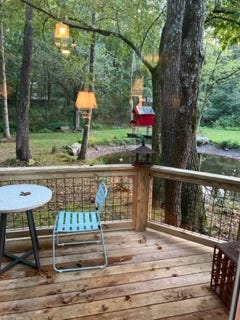
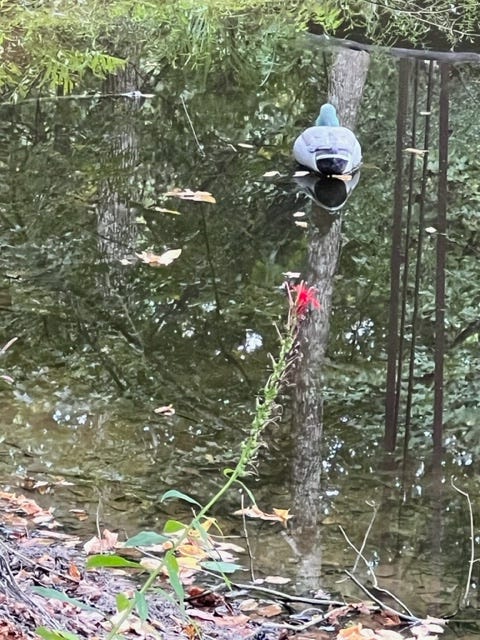
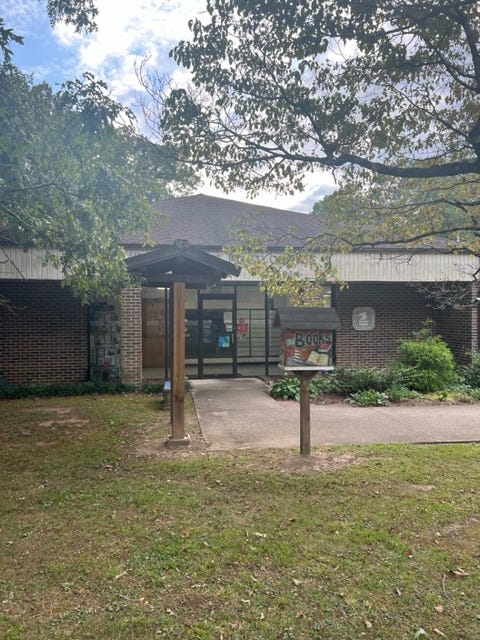
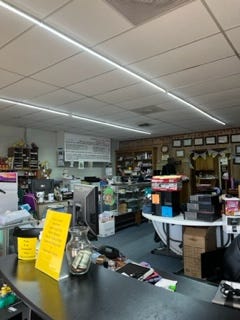

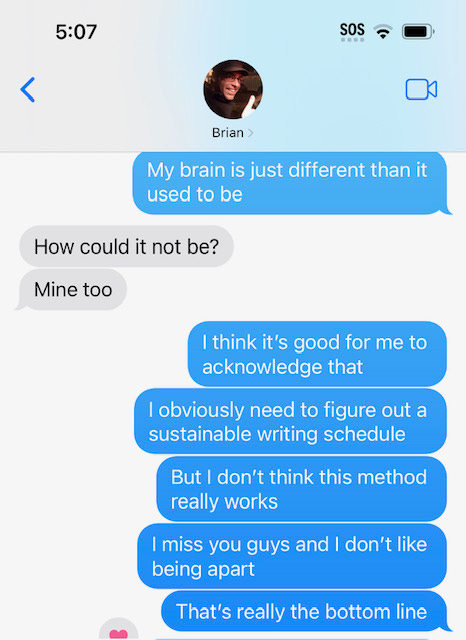
Loved this, Kristen!
I relate to so much of this. I used to be a person who got my best work done between the hours of 8am-3pm. Sometimes I would even start earlier. Lately I cannot get any forward motion on anything that requires creative brain power until after noon. It has been frustrating to try to learn/create new rhythms, but also oddly exciting to know that I am a person who is still changing and not as locked in my ways as I thought. Is it aging, or evolution, or some form of both?